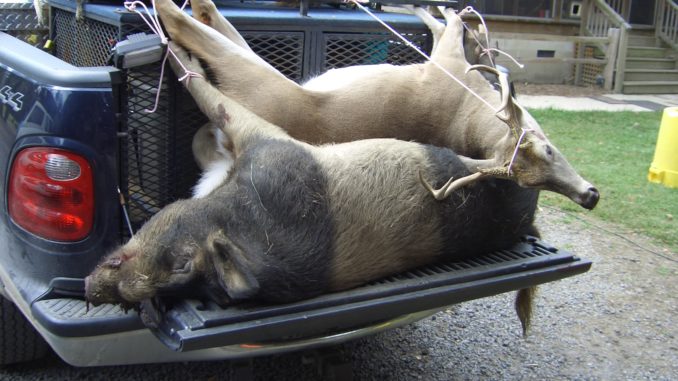
Several bills involving wildlife management have been introduced into the 2011 N.C. General Assembly.
If adopted and signed by the governor, they would affect statewide hunting rights, using dogs at night to track wounded wild game, crossbow permits, deer hunting with dogs in one county, use of center-fire rifles at another county and declassify wild boar as feral pigs.
The following includes a synopsis of these bills:
Senate Bill 374
This bill, the “Landowner Protection Act,” would require written permission from a landowner to hunt on that landowner’s property in any county in North Carolina. In effect, the bill would make the entire state a “written-permission” area. More than 40 counties already have written permission codes, but this bill would supersede those local laws.
The bill also would prohibit hunting from state-maintained rights-of-way. Exceptions include game lands where such hunting is permitted. In all other cases, a person couldn’t have in his or her possession a loaded firearm outside the compartment of a vehicle while “in the act of taking or attempting to take wildlife” unless he owns the land on both sides of the road or leases land on both sides of the road and has written permission to hunt.
Written permission from landowners would be good for only 12 months, which means re-acquiring written permission each year. Permission slips would have to be shown, upon request, to any Commission enforcement officer, sheriff or deputy sheriff or other law enforcement officer with general jurisdiction.
Senate Bill 429
This bill nearly mirrors SB 374, except it also covers posted land and says anyone who goes on posted land to hunt, fish or trap without written consent from the owners may be arrested, except they can’t be arrested in Halifax or Warren counties without consent of the landowner.
Hunters looking for dogs that may have strayed onto posted land are protected from arrest as long as they don’t carry a firearm or bow and arrow or operate a motor vehicle on the posted land. No one can enter non-posted land without written permission.
House Bill 432
This bill is entitled “Swine in Transport/Regulate Feral Swine” and addresses several concerns.
The part hunters should take note of declassifies free-ranging feral swine (pigs) of the species scrofa, which includes wild boar, to provide for their taking non-game animals in all counties.
The bill likely will draw opposition from hunters in western North Carolina, particularly Cherokee, Clay, Graham, Jackson, Macon and Swain counties, which have open season for wild boar, and where wild boar are hunted with dogs. It also could be opposed by the N.C. Wildlife Resources Commission, which prohibits the taking of wild boar over bait in those six counties. In the other 94 counties, feral hogs are not classified as game animals and can be taken at any time, including over bait.
Since feral pigs are large animals, the bill also would alter a long-standing Commission regulation about the caliber of pistols used. However, it leaves to the Commission the right to restrict or prohibit pistol use during special seasons or in areas restricted to the use of primitive weapons (archery, muzzleloader).
House Bill 29/Senate Bill 66
These companion bills, entitled “Retrieval of Big Game,” would allow a hunter who had wounded an animal near sunset to use a single tracking dog on a leash to help find the animal at night.
A hunter would be restricted to using a .22-caliber rimfire pistol, archery equipment or a handgun legal for that hunting season to dispatch a wounded animal.
Pursuit and retrieval of an animal would have to occur between 30 minutes after sunset to 11 p.m., but without the use of a motor vehicle.
Senate Bill 358
This bill’s short title is “Repeal Crossbow Purchase Permit Requirement” and would end the current requirement that a person obtain a permit to receive, purchase or otherwise transfer a crossbow to another person.
Currently, anyone who wishes to purchase a crossbow is required to obtain a permit from their county sheriff — the same permit used to obtain a handgun.
The legislation also would allow individuals to purchase on-line crossbows and have them delivered by mail, which is currently not permitted.
House Bill 245/Senate Bill 238
These companion bills would regulate deer hunting with dogs in Richmond County.
It would require deer-dog hunters to have permission to hunt areas of at least 640 acres (one square mile), except a person could hunt with dogs at his or her own property, but that land would have to be at least 250 acres.
It would allow dog deer hunting at contiguous tracts on which hunting rights are owned, leased or controlled by a hunting group to make up the minimum 640 acres or more acreage.
All boundaries would have to be posted, along with entry routes and roads as a Dog Hunting Area, and the county would issue Dog Deer Hunting Area Permits.
Each hunter in a DDHA would have to carry written permission to hunt or proof of membership to the club or group holding deer hunting rights to the property.
One or more hunters would be designated as “hunt masters” and would be responsible for the party’s compliance with requirements.
Every dog would be required to have a metal tag attached to its collar displaying the name, address and telephone number of its owner/handler and the DDHA permit number.
House Bill 362
This bill would make it unlawful to hunt with a centerfire rifle in Pasquotank County unless the hunter is in a permanent or portable stationary hunting stand that raises the lower level of a gun barrel to a minimum of eight feet above ground level.
This law apparently was introduced to prevent “road hunting,” i.e., firing weapons at deer from public roads while inside a vehicle. It doesn’t apply to a landowner or lessee of property using a centerfire rifle for self-protection or to prevent crop depredation.




Be the first to comment